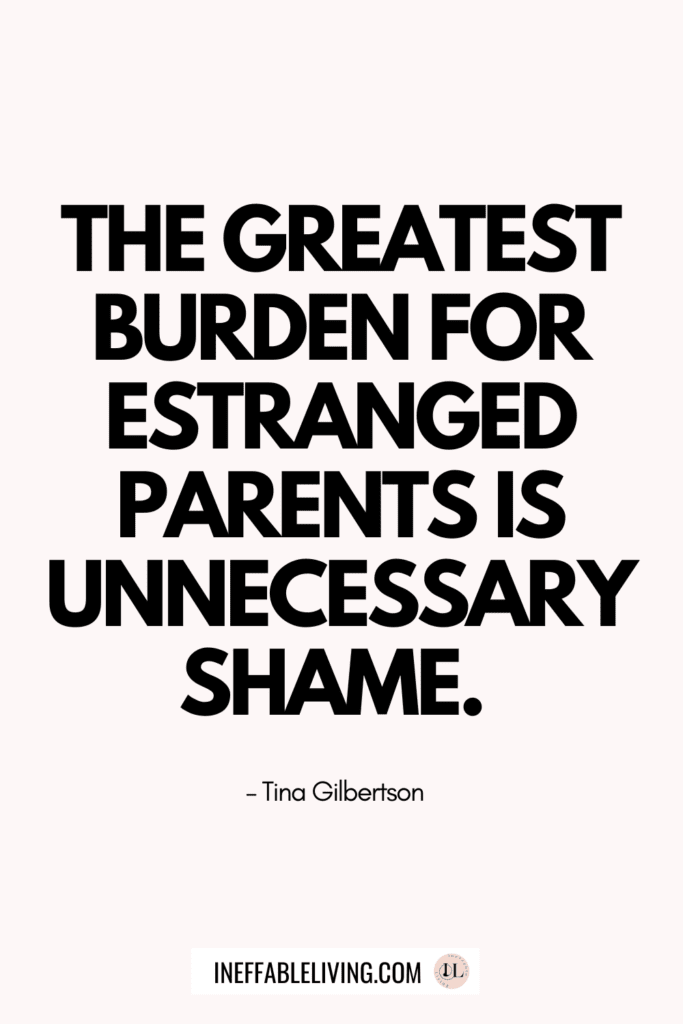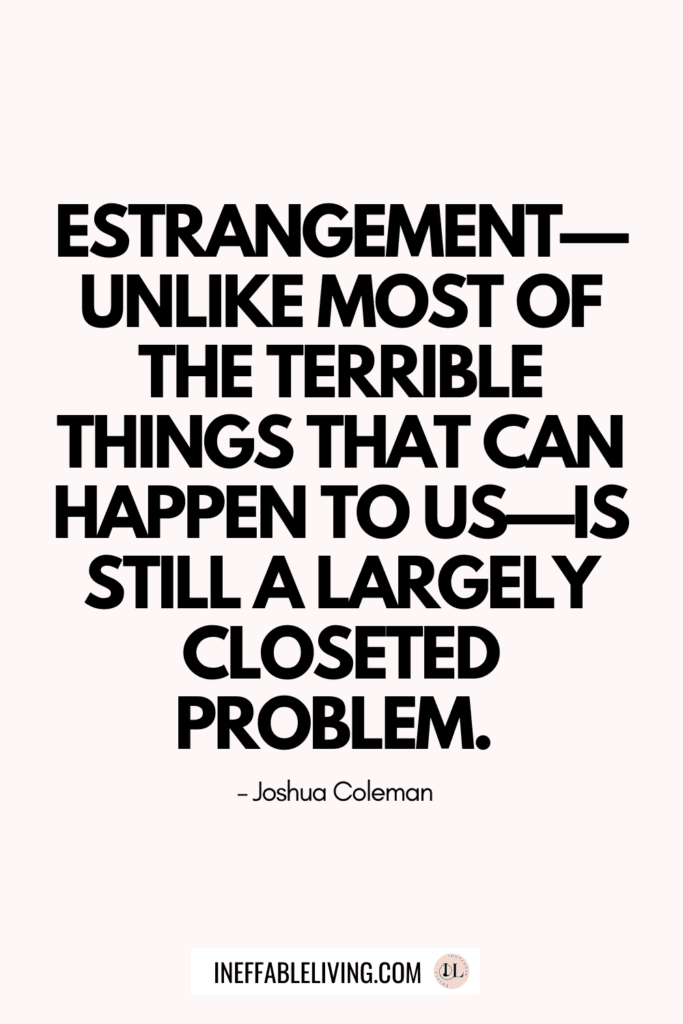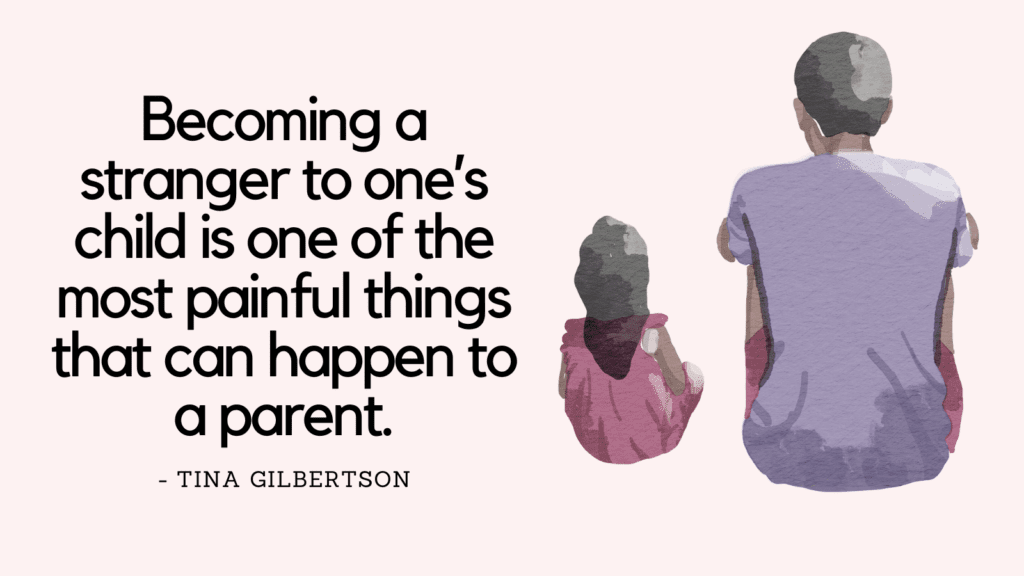This post contains some of the best family estrangement quotes that will make you feel seen.
What Is Family Estrangement?
Family estrangement refers to a situation where there is an emotional and physical distance between family members, often resulting in a significant breakdown in communication and connection.
It occurs when one or more family members intentionally detach themselves from the rest of the family or when there is a mutual decision to sever ties.
Estrangement can manifest in various ways, such as cutting off contact completely, having limited or superficial communication, or maintaining a strained relationship.
It can happen between parents and children, siblings, or extended family members.
Estrangement can stem from a variety of reasons, including unresolved conflicts, betrayals, abuse, differing values or beliefs, poor communication, or long-term patterns of unhealthy behavior.
Each situation is unique, and the reasons for estrangement can vary greatly.
It’s important to note that family estrangement can be a complex and emotionally challenging experience for all parties involved.
People may have different feelings, perspectives, and experiences surrounding the estrangement.
It can bring about a range of emotions like sadness, anger, guilt, or relief, depending on individual circumstances.
Top 35 Family Estrangement Quotes
1. “You and your estranged child also share the task of explaining to friends why you won’t be getting together with the family for the holidays this year. Believe it or not, it’s the same awkward conversation for him that it is for you. Estranged adult children, for the most part, feel unsupported when they share the sensitive information that they’re estranged from you. Friends, relatives, and society all pressure them to reconcile.” – Tina Gilbertson
2. “While the complaints of estranged adult children are sometimes surprisingly rigid and hurtful, often they are plaintive, even desperate, in their limits, requests for boundaries, even ultimatums. At least they can start that way. Over time, in response to the parent’s defensiveness or hostility, they become more rigid and rejecting.” – Joshua Coleman
Related: Top 18 Self Esteem Exercises (+FREE CBT For Self-Esteem Worksheets PDF)
3. “While estrangement offers a way for the adult child to feel proud or “liberated,” it more generally offers only shame, humiliation, or grief for the parent.” – Joshua Coleman
4. “Whether an estrangement is sudden or gradual, you’ll find yourself flooded with images of rocking her in your arms while she was sleeping, swaddled in a blanket her grandmother gave her. You’ll see her face on the day she was born, brought newly into the world. You’ll remember crayoned Mother’s Day/Father’s Day cards (which you still have); you’ll remember running behind her, holding the seat of her first bike as you let go and she sails down the street.” – Joshua Coleman
5. “This is not to say that most adult children choose estrangement lightly, or that they pay no social cost. In my experience, most adult children estrange themselves only after a long period of trying to have a better relationship with the parent.” – Joshua Coleman
6. “The word estrangement comes from the Latin word extraneare, meaning “to treat as a stranger.” Becoming a stranger to one’s child is one of the most painful things that can happen to a parent.” – Tina Gilbertson

7. “The truth is that no adult child will step into a therapy office with a formerly estranged parent until they feel that their interests are protected, and that the person (me) leading them into potential battle will shield them from the ways that the parent could still be hurtful.” – Joshua Coleman
8. “The original blood parent may reach a point in which she has to decide between her new spouse and her children. Even when she chooses her children and separates from the heretofore stepfather, there will still be serious adjustments that the children have to make. If their father or mother remarries or re-cohabitates time and time again, the children may grow to see their parents as something less than positive role models. Especially if the parents appear to have little regard for how the changes are affecting their children’s lives, the children’s resentment may fester into estrangement over time.” – Jon P. Bloch
Related: How To Be Gentle With Yourself? Top 5 Ways To Practice Self-Compassion
9. “The greatest burden for estranged parents is unnecessary shame.” – Tina Gilbertson
10. “That question, “Do you have children?,” was so easy at one time. “Yes, I have two,” or “Yes, a little girl,” was your automatic answer. But it’s not that simple anymore. Now you’ve got an adult child who’s not talking to you, and you’re not sure what to say when asked about children. You may not even know where he lives. You may have a grandchild you’ve never met.” – Tina Gilbertson
11. “Sometimes the cause of the estrangement lies somewhere in that vast desert between—where the complexities of each person’s personalities, histories, challenges, or genetics ping-pong back and forth off the other’s, and conflict operates less as cause and effect and more like a feedback loop, endlessly amplifying the worst instincts of the parent, adult child, or anyone else who wants to step into the fray.” – Joshua Coleman
12. “Some parents resent feeling scolded, threatened with estrangement, or accused of prejudice by their children for failing to adopt these new ways of thinking about gender. That’s understandable.” – Joshua Coleman
13. “Parents whose children are both estranged and suffer from mental illness live within layers upon layers of sadness, worry, guilt, regret, and grief.” – Joshua Coleman
14. “Parents who were once advised to stay together for the sake of the children are now told: If you’re not happy, then your kids won’t be happy. The belief that one should respect his or her elders has been replaced with the truism that respect isn’t given, it’s earned. Values that once prioritized the family— these include obligation, responsibility, loyalty—have been radically reconfigured to emphasize the happiness and well-being of the individual.” – Joshua Coleman

15. “Parents have to go first. They have to give their child the space and time to talk about why the estrangement was necessary. They have to sit there and tolerate the pain, sorrow, and guilt it evokes; they have to empathize, mirror, find the kernel if not the bushel of truth.” – Joshua Coleman
16. “Parents don’t talk about estrangement to their friends, coworkers, even their own family, because they fear judgment. They fear someone will say or think: “What did you do to your child? It must have been something terrible.”” – Joshua Coleman
17. “Most adult children don’t choose estrangement lightly and probably hold, someplace in their hearts and minds, a wish that it could be otherwise.” – Joshua Coleman
18. “Many estranged adult children also worry their voices will be lost if they empathize with their parent. They worry they’ll feel guilty once they fathom how much the estrangement hurt the parent—and, they fear the result of reconciling out of guilt instead of genuine desire. They worry that they’re giving a pass on the parent’s prior hurtful behavior by agreeing to be back in contact. They’re concerned that the strength they need to counter the parent’s authority will be overwhelmed by their feelings of responsibility for them.” – Joshua Coleman
Related: Best 18 Self Compassion Journal Prompts (+FREE Worksheets)
19. “In my survey of more than 1,600 estranged parents, roughly 75 percent of them became estranged after their divorce from the other biological parent. My experience is that divorce can cause a radical realignment of long-held bonds of loyalty, gratitude, and obligation. It can cause children to reexamine their lives prior to divorce and shift their perspective so that they now support the other parent. It can swing the perception of the child away from viewing the family as a singular unit and instead to a loose affiliation of individuals with their own relative strengths and weaknesses.” – Joshua Coleman
20. “In addition, the relative power of the adult child, if estranged, is heightened by the suffering faced by the parent as a result of the estrangement. This means that the parent will necessarily have to find a way to empathize with and comprehend the perspective of their adult child if they want to restore the relationship, while the adult child isn’t necessarily under the same obligation.” – Joshua Coleman
21. “If your estranged child is under the age of thirty or has recently left home, he may simply be undergoing a normal phase of adult development that calls for more psychological distance from parents. It’s a stage that can be alarming for both parents and children, but it doesn’t last forever.” – Tina Gilbertson
22. “For the adult child, the decision to estrange the parent, however painful, is nonetheless tied to a narrative of liberation from oppressive forces and the pursuit of happiness. There is no equivalent upside for the parent. It’s all downside: failing at life’s most important task; being denied the valued reflection of oneself as a parent; feeling shame before one’s peers and family; losing not only the adult child, but often a relationship to cherished grandchildren.” – Joshua Coleman
23. “Estrangement—unlike most of the terrible things that can happen to us—is still a largely closeted problem.” – Joshua Coleman
24. “Estrangement is painful and confusing. It’s also complex: there are no one-size-fits-all solutions.” – Joshua Coleman
25. “Estrangement is often a similar attempt to reduce the hold that the parent continues to have over the adult child. However painful the separation, many adult children report that ending the relationship with the parent was the only way they could find to take control over their own lives. To consider reconciling, an adult child needs to feel assured that they can return to the estrangement if they decide that reconciliation was a bad idea.” – Joshua Coleman
26. “Estrangement is a harsh word. In some cultures there are rituals for officially banning people from the family. But for many people in our society, estrangement happens more casually; you just do your best to avoid certain family members.” – Jon P. Bloch
27. “Estrangement doesn’t happen overnight, and it won’t be healed that quickly, either. Although this is a manual for repairing your relationship with your child and creating lasting change, that undertaking will require consistent effort over time.” – Tina Gilbertson
Related: Best 25 Journal Prompts For Self Love And Confidence Building
28. “Estranged parents always want to know how long it will take before it ends. Sadly, we never know. Our children have their own timeline; parents sometimes have only so much power or ability to influence it. Your main task is to make it clear that you’re available, you’re willing to work on yourself and the relationship, and you’re willing to respect your child’s needs for a relationship that’s more in line with their ideals.” – Joshua Coleman
29. “Dealing with an estrangement is no small task. Whatever the cause, rejection from the person whose opinion and love you care the most about—whom you love with a mightiness that only another estranged parent could understand—makes the certainties of life feel precarious and unraveled. Tender memories that seemed impervious to revision become infested with doubt and self-criticism. The times you know you were far from your best parenting self are thrust into a torturous spin cycle of If only I hadn’t said that, done that, wrote that.” – Joshua Coleman
30. “Another client explained the estrangement by saying that being around the parent made her depressed and unable to focus on her own feelings. “You were so worried and overinvolved growing up. It made me doubt myself. Whenever I’m around you, I can feel all those feelings start to surface. You’d have to do a lot more work on yourself for me to want to have contact again.” – Joshua Coleman
31. “Although you enter estrangement in pieces, it’s a crucible that can make you whole again — not just as someone’s parent, but for yourself.” – Tina Gilbertson
32. “A parent and an estranged adult child have very different goals. Put simply, most parents want to have as much contact as possible with their adult child. But that’s not the goal of estranged adult children. Their goals tend to be the following: How can I feel like a happy, healthy person in the context of spending time with my parent(s)? From that perspective, adult children need to go slowly and be in charge of the terms; the psychological territory they’re attempting to navigate is more complex.” – Joshua Coleman
33. “It’s clear that the vast majority of estrangers do not cut ties with their parents on a whim, for purely materialistic reasons, or just because someone else tells them to. So — please don’t let me lose you here — contact with Mom or Dad has to be pretty darn painful to be worse than no contact.” – Tina Gilbertson
34. “For many adult children and their advocates, estrangement is considered a healthy response to an unhealthy situation. They feel better with distance — healthier, and even happier from day to day. I can’t stress enough that no one should be forced, coerced, or shamed into participating in relationships that hurt them, either emotionally or physically — even with family.” – Tina Gilbertson
35. “Healing the rift of estrangement is possible, but shame, guilt, and anger can make the work much harder for parents than it needs to be. Just about any parent, estranged from their kids or not, harbors some degree of shame, regret, or feeling of inadequacy. Some parents hide it better than others, but if you’re in touch with reality, you know how easy it is to go wrong when rearing another human being. It’s almost impossible not to feel inadequate in the face of such a monumental challenge. Nobody gets it 100 percent right — not even close — and shame is the unfortunate by-product of caring how you’re doing.” – Tina Gilbertson
Related: Best 25 Journal Prompts For Self Love And Confidence Building

References
- Family Estrangement: Advice and Information for Adult Children – Stand Alone
- What is family estrangement? A relationship expert describes the problem and research agenda (theconversation.com)
- Family estrangement: Why adults are cutting off their parents – BBC Worklife
- Family Estrangement | Psychology Today
- Why Parents and Kids Get Estranged – The Atlantic
- Family rifts affect millions of Americans – research shows possible paths from estrangement toward reconciliation (theconversation.com)
- Pillemer: Family estrangement a problem ‘hiding in plain sight’ | Cornell Chronicle



